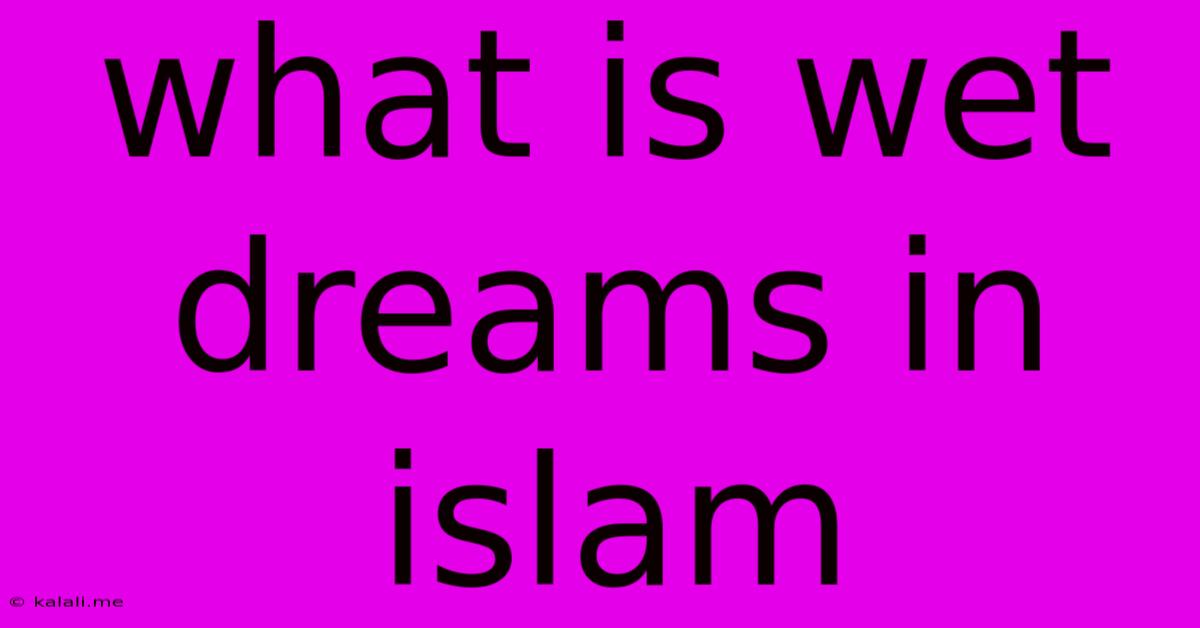What Is Wet Dreams In Islam
Kalali
May 21, 2025 · 2 min read

Table of Contents
What are Wet Dreams in Islam? Understanding Nocturnal Emissions and Islamic Teachings
Wet dreams, also known as nocturnal emissions, are involuntary ejaculations that occur during sleep. This natural bodily function is experienced by many, regardless of religious background. However, understanding the Islamic perspective on wet dreams is crucial for maintaining spiritual well-being and dispelling any misconceptions. This article will explore the Islamic view on wet dreams, addressing common concerns and offering guidance based on religious texts and scholarly interpretations.
What Islam Says About Wet Dreams
Islam views wet dreams as a natural physiological process, not a sin. The Prophet Muhammad (peace be upon him) himself addressed this topic, clarifying that nocturnal emissions are not considered sinful actions. This is significant because it relieves any guilt or shame individuals may feel. The emphasis in Islam is on maintaining purity through ritual cleansing (ghusl), not on judging involuntary bodily functions.
The Importance of Ghusl After a Wet Dream
While wet dreams are not inherently sinful, Islamic teachings emphasize the importance of performing ghusl, a full ritual washing of the body, after experiencing one. This is not a punishment, but rather a reaffirmation of ritual purity and cleanliness, a crucial aspect of Islamic practice. Ghusl is required to prepare for prayer and other acts of worship. The act of performing ghusl after a wet dream signifies a commitment to maintaining physical and spiritual cleanliness.
Addressing Misconceptions and Concerns
Several misconceptions surround wet dreams in Islam. It’s important to dispel these to ensure accurate understanding:
- Wet dreams are not a sign of weakness or immorality: This is a common misconception. Nocturnal emissions are a natural biological function, unrelated to moral character.
- Guilt and shame are unwarranted: The Prophet Muhammad (peace be upon him) clearly stated that wet dreams are not sinful. Feeling guilty about something so natural is counterproductive.
- Ghusl is obligatory, not optional: Performing ghusl after a wet dream is a religious obligation in Islam. Failing to do so would render prayers invalid.
Practical Guidance and Steps for Ghusl
The process of ghusl involves washing the entire body thoroughly, ensuring all areas are cleansed. While the specific details might vary slightly depending on scholarly interpretations, the core principle remains the same: complete cleanliness. Seeking guidance from knowledgeable religious figures can provide a comprehensive understanding of the proper procedure.
Conclusion: Embracing a Healthy Islamic Perspective
Understanding the Islamic perspective on wet dreams helps individuals approach this natural bodily function with clarity and peace of mind. It’s important to remember that nocturnal emissions are not sinful, but the subsequent ghusl is a necessary ritual for maintaining spiritual purity. By dispelling misconceptions and embracing a balanced understanding, Muslims can maintain a healthy and positive perspective on this natural aspect of human biology. Focusing on maintaining spiritual hygiene through prayer, reflection, and good deeds is more significant than fixating on involuntary bodily functions.
Latest Posts
Latest Posts
-
Which Terminal Connect First Car Battery
May 21, 2025
-
Why Did Jesus Turn Water Into Wine
May 21, 2025
-
What Is Com In Light Switch
May 21, 2025
-
How To Find Missions Gta 5
May 21, 2025
-
Error For Site Owner Invalid Key Type
May 21, 2025
Related Post
Thank you for visiting our website which covers about What Is Wet Dreams In Islam . We hope the information provided has been useful to you. Feel free to contact us if you have any questions or need further assistance. See you next time and don't miss to bookmark.